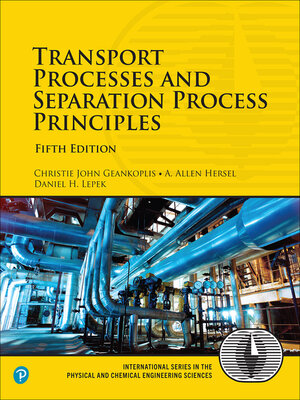Transport Processes and Separation Process Principles
ebook ∣ International Series in the Physical and Chemical Engineering Sciences
By Christie John Geankoplis

Sign up to save your library
With an OverDrive account, you can save your favorite libraries for at-a-glance information about availability. Find out more about OverDrive accounts.
Find this title in Libby, the library reading app by OverDrive.



Search for a digital library with this title
Title found at these libraries:
| Library Name | Distance |
|---|---|
| Loading... |
Transport Processes and Separation Process Principles, Fifth Edition, offers a unified and up-to-date treatment of momentum, heat, and mass transfer and separations processes. This edition–reorganized and modularized for better readability and to align with modern chemical engineering curricula–covers both fundamental principles and practical applications, and is a key resource for chemical engineering students and professionals alike.
This edition provides
Part 1 thoroughly covers the fundamental principles of transport phenomena, organized into three sections: fluid mechanics, heat transfer, and mass transfer.
Part 2 focuses on key separation processes, including absorption, stripping, humidification, filtration, membrane separation, gaseous membranes, distillation, liquid—liquid extraction, adsorption, ion exchange, crystallization and particle-size reduction, settling, sedimentation, centrifugation, leaching, evaporation, and drying.
The authors conclude with convenient appendices on the properties of water, compounds, foods, biological materials, pipes, tubes, and screens.
The companion website (trine.edu/transport5ed/) contains additional homework problems that incorporate today's leading software, including Aspen/CHEMCAD, MATLAB, COMSOL, and Microsoft Excel.







